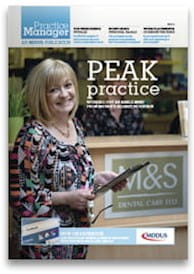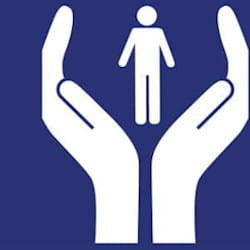NEXT STOP…HEALTHY TOWN Diary appreciates a good utopian vision as much as the next guy – especially when it comes from no less than Simon Stevens, chief executive of NHS England. Speaking recently at The King’s Fund in London, Stevens announced plans to design 10 new “healthy towns” in England with clean living integrated into the “built environment from the start”. He envisages the plan as “some kind of idealised version of Amsterdam” (presumably without the cannabis cafés) where planners will tackle the shortage of low-cost housing but also “design out the obesogenic environment for our kids, and design in support for independent living for older people and enable new ways of technologyenabled primary and community care right from the get-go”. This means fast-food-free areas near schools, green spaces, dementia-friendly streets where the elderly navigate with ease and children walk or cycle safely to school “rather than just exercising their fingers on video games”. Good luck with that.
JUST NOT SORRY Struggling to get ahead in your career? It may be your choice of words in emails are to blame. Including phrases like “I’m just writing to say…”, “I’m no expert but…”, “does that make sense?”, or apologising too much could be causing colleagues to lose respect for you and undermining your authority at work. According to the Daily Mail, the habit has prompted New York-based entrepreneur Tami Reiss and the tech team at Cyrus Innovations to create the web browser plug-in Just Not Sorry. It acts like a kind of spell-check in flagging up self-demeaning language to encourage you to eliminate it. Tami advises email writers to “‘be nice, be polite and be direct. Be clear, honest and open – and that’s true if you’re asking someone to do something or if you’re responding to a request for something.” She says we should stop saying sorry but also be careful not to come across as too negative or aggressive. Diary is no expert but…
BABY COME BACK Desperate times demand desperate measures. Diary recently noted that NHS Education for Scotland (NES) has responded to the ongoing recruitment crisis in primary care by announcing plans to send delegates to a medical conference in Perth to meet UK-trained GPs practising in Australia and coax them back to Scotland. Surely they must be sick of all that sunshine and easy living by now. NES says on its website: “With the development of a new GMC contract underway, more investment in general practice, access to the NHS pension scheme and a health service that is arguably one of the best in the world, there is much to commend working as a GP in Scotland right now. Why not come back to enjoy our four seasons of weather (sometimes in one day), our diversity of culture and proximity to the rest of the world. Scotland is more than ever a wonderful place to live and work.” Dr Dean Marshall of the GPC executive team is less than convinced. “What we need to do is concentrate on keeping the ones we’ve got.”
EAR NO MORE Medical staff have one man’s shyness to thank for the invention of that indispensable diagnostic tool – the stethoscope. In 1816, when confronted with an overweight female patient complaining of heart problems, the sober French physician René Laënnec felt the usual practice of pressing one’s ear against the patient’s chest was not appropriate. A keen flute player, the idea came to him to roll up a piece of paper into a tube and press it against her chest. In a research paper published in 1819, he described how he was “not a little surprised and pleased to find that I could thereby perceive the action of the heart in a manner much more clear and distinct than I had ever been able to do by the immediate application of my ear.” His early hollow wooden prototypes were eventually improved upon in the 1850s into a design very similar to that used today. The pioneering Laënnec, who died of tuberculosis aged just 45, was celebrated in a recent Google doodle on what would have been his 235th birthday.
WHY WOMEN SHOULD NOT BE DOCTORS Last month on International Women’s Day it was noted that females now comprise around 45 per cent of registered medical practitioners and 51 per cent of registered general practitioners in the UK – a far cry from the early Victorian period when the number of women doctors could be counted on one lace-gloved hand. Diary recently came across a blog by Claire Cock-Starkey who had trawled nineteenth century medical journals to compile a list of Why Women Shouldn’t be Doctors (According to Victorian medical men). Here are just a few of the highlights. From “Lady Doctors” in Medical Press and Circular, 23 February 1870: “Everyone knows that there is an abundance of cases of disease where a physician absolutely cures, not by his pathological knowledge, nor yet by his acquaintance with medicines […] but […] by the prestige of his mere presence; by being able to ‘put his foot down’; in one word, by being a – man.” And from “The Woman as a Physician” in Medical Press and Circular, 6 April 1892: “they [women] never know why they have failed until they have asked some man”. Best of all is The Lancet correspondent who wrote to the journal in 1895 worried that the editor might “perhaps be tempted to sacrifice dignity to popularity and insert a weekly article on Fashions and perhaps also a column of Gossip, to please your numerous feminine readers”.
CALL FOR DIARY ITEMS Do you have any tidbits, anecdotes or absurdities in a similar vein to the items above? Please write in or email them to PM@mddus.com
This page was correct at the time of publication. Any guidance is intended as general guidance for members only. If you are a member and need specific advice relating to your own circumstances, please contact one of our advisers.
Read more from this issue of Practice Manager

Save this article
Save this article to a list of favourite articles which members can access in their account.
Save to library


